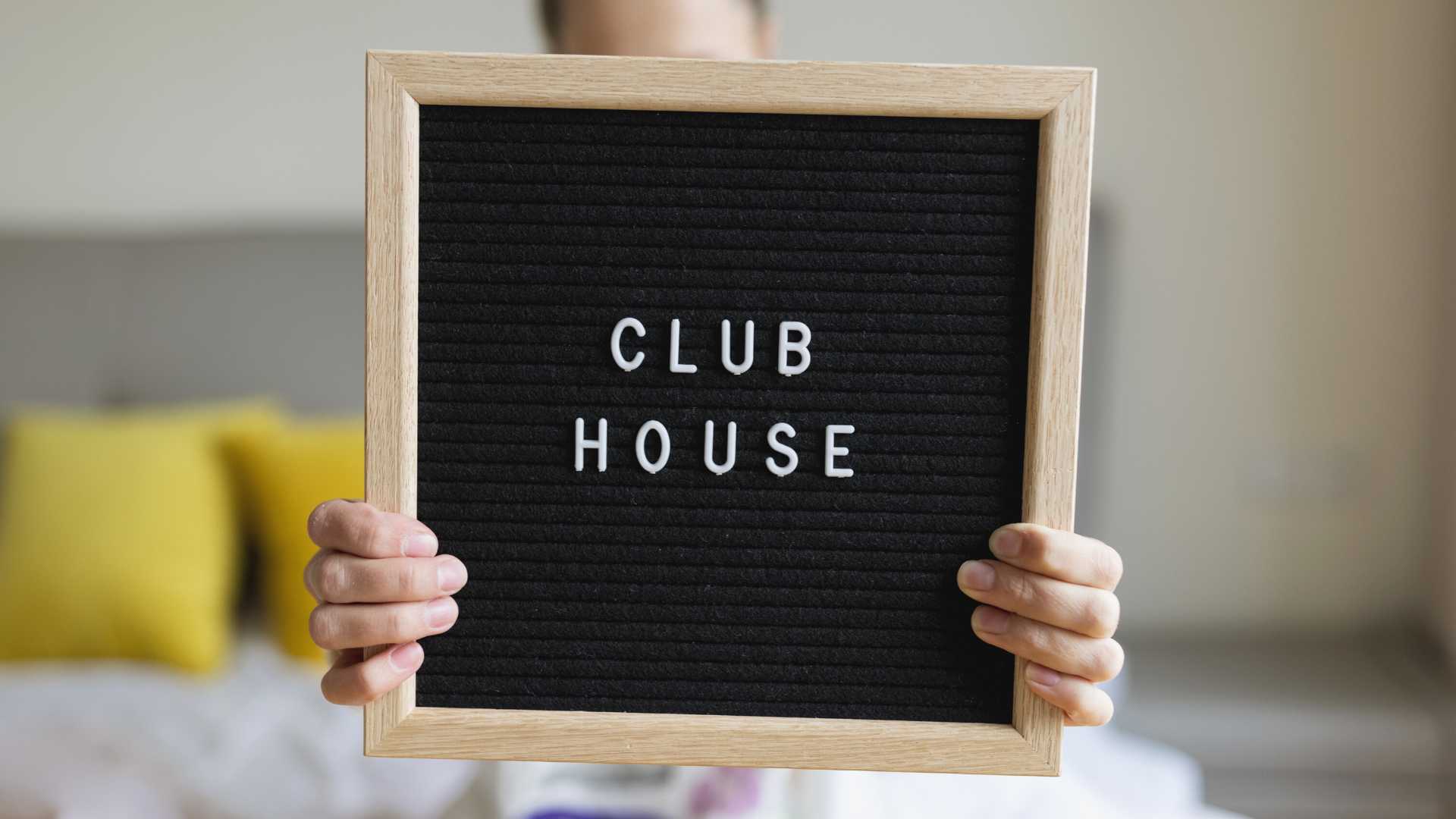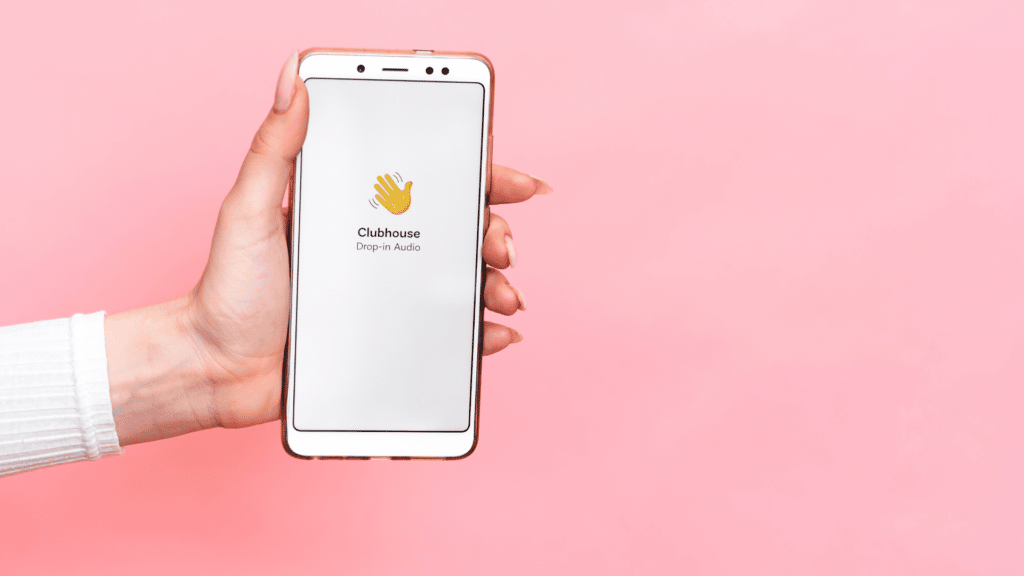
Clubhouse – Everything You Need To Know
Last Updated on October 16, 2025 by Valerie Jennings
We’ve all heard the Clubhouse buzz by now. The exclusive, iOS invitation-only audio app has been all over social media for the past few months. Keep reading to get the inside scoop.
Clubhouse – What is it?
Clubhouse is one of the biggest social media marketing trends in 2021. According to the iOS App Store, Clubhouse is “a space for casual, drop-in audio conversations – with friends and other interesting people around the world.” In Clubhouse’s own words, they’re “a new type of social product based on voice [that] allows people everywhere to talk, tell stories, develop ideas, deepen friendships, and meet interesting new people around the world.” The app has been referred to as the “hot new social app” and the big question across platforms is, how do you get an invite?
How does it work?
As an audio conversation app, Clubhouse consists of “rooms” on all kinds of topics ranging from health to criminal justice. The app lets you follow people and topics you find interesting, which creates a list of all rooms available to you within your interests and connections. You can also set up notifications to be notified when rooms open that you might be interested in. Anyone can start a room, with the option of making it closed, social or open. Closed rooms are invite-only, social rooms are open to your connections, and open rooms are open to anyone who wants to join. The user who created the room bestows speaking privileges to its participants.
The topics on the app include Sports (MMA, cycling, golf, cricket, baseball), Life (weddings, parenting, traveling, support), Faith (Judaism, Islam, Sikhism, Atheism, Taoism), Places (Nigeria, San Fransisco, Los Angeles, London, India), Wellness (outdoors, meditation, veganism, psychedelics), Tech (AI, engineering, SaaS, Angel Investing, Crypto. According to Ren Robinson, founder and CEO of Beautystat, and owner of the biggest beauty room in Clubhouse with more than 24,000 members, the app is getting more and more niche. “You could create a room and talk about something really specific – I was just in a room the other day talking specifically about sunscreens.”
There is not much data on usage yet, but, according to Influencer Marketing Hub, a woman reported being on Clubhouse for more than 40 hours a week, while other users seem to use the app between 11-22 hours a week.
Enormous growth in less than a year
Launched in April 2020 by Paul Davison and Rohan Seth of Alpha Exploration Co., the app has grown from 1,500 registered users in May 2020 to 10.1 million as of February 2021, according to Backlinko. Clubhouse is an iOS-only app, meaning it’s only available on iPhones (sorry Android fans!). As an invite-only app, you have to know someone who is already an existing user, but keep in mind users are only given 2 invites upon registration. They can, however, earn more as they use the app. The app also allows you to reserve your username and get on the waitlist, but how long one must wait is unknown.
Clubhouse is currently #5 in the App Store under the “Social Networking” category, behind Facebook, Messenger, WhatsApp and Discord, with more than 600,000 ratings in the App Store and an average of 4.8/5 stars. According to Backlinko, the app was downloaded 2.3 million times in January 2021 alone. Exploding Topics also reports that searches for “clubhouse app” on search engines have increased by 99 times over the last 6 months. Clubhouse is currently the most downloaded app in Japan, Slovakia, and Turkey.
Why did its popularity skyrocket?
Its demand has grown due to the app being audio-only, meaning it doesn’t require an effort of self-presentation. But also because the app has drawn in a lot of celebrities and other “elites”. Some of the app’s top users are Meek Mill with 2.2 million followers, Elon Musk with 1.4 million followers, and 21 Savage with 1.5 million followers. Other celebrities on Clubhouse include Oprah Winfrey, Drake, Kevin Hart and Tiffany Haddish.
The app’s first influencer was the founder of Better Tomorrow Ventures, creator and investor, Sheel Mohnot. The New York Times reports he has found himself in music videos by Justin Bieber and Ariana Grande after connecting with record executive Scooter Braun on the app. He is also a regular at the “Back of the bus” which, according to Influencer Marketing Hub, is a room in Clubhouse of 30-50 people who meet around 10 p.m. every night.
Clubhouse later launched an invite-only Creator Pilot Program with around 40 influencers. According to Influencer Marketing Hub, these influencers get early access to features and special tools in the app.
How can marketers use Clubhouse?
According to the Drum, Clubhouse can be effective in PR and sales as “public relations staffers could create private rooms for purposes such as analyst calls, press briefings and community relations. B2B sales teams could create private rooms for discussions with all company stakeholders involved in approving expensive purchases.”
However, there are already endless ways to do conference calls. What is so special about Clubhouse? A PR and sales team would most likely prefer using a platform with video. It is also questionable how marketers would use the platform for influencer marketing without any visuals. While they could just hype up products in chat rooms, video is usually helpful in the sense of showing off the products, not just talking about them.
While maybe not essential for influencer marketing, Clubhouse could be useful for internal communications at larger companies and agencies. It would allow remote teams to meet and talk, in a more interesting setting than regular emails.
How much Is Clubhouse Worth?
In May of 2020, the app’s value was $100 million after Series A funding with a $12 million investment from Andreesen Horowitz, a capital firm in the U.S. At that time, Clubhouse only had approximately 5,000 beta test users, according to Influencer Marketing Hub. However, the app experienced intense growth in less than a year with more than 180 investors and a company value of $1 billion as of January 2021, according to Fortune. According to Clubhouse, they are currently pre-revenue, which means it has yet to generate any sales.
Controversy
With popularity came controversy. As the Guardian said, the hot new social app “spells nothing but trouble.” While many believe Clubhouse is the future of social media, it has also received a lot of criticism. Many believe the app has a lack of abuse and content moderation, and the New York Times reported there were “numerous complaints that Clubhouse hasn’t done much to protect folks from abuse.” According to Bloomberg, critics believe “the lack of records and light moderation allows harassment to flourish unchecked,” and Vox says it “allows for misinformation and hate speech to spread.”
A Stanford cyber-security researcher discovered security flaws in the app including “the users’ unique ID numbers and the ID numbers of Clubhouse chatrooms they created were being transmitted in plaintext and it could be possible connect IDs to specific user profiles. The researchers were also concerned that the Chinese government could gain access to the raw audio files on Clubhouse’s servers because its back-end infrastructure is provided by a real-time engagement API firm called Agora, which has offices in both Shanghai and San Francisco. When Agora went public on Wallstreet in June, they mentioned filing with the US Securities and Exchange Commission (SEC) that in China it would be required to ‘provide assistance and support in accordance with the law for public security and national security authorities to protect national security or assist with criminal investigations.’”
Vox agrees privacy is said to be a big issue with Clubhouse, especially with recent incidents of chats being streamed to third-party websites. The article also points out the app is “overly aggressive with its connection recommendations.” Not only does it connect to your phone’s contacts (even people who aren’t in your contacts but you’re in theirs), but it also encourages you to connect your Instagram and Twitter accounts to your profile on Clubhouse.
Popsugar reports the app has become a “space for people to harass and discriminate against people in marginalized communities, like Black women and Jewish people.” While Clubhouse has moderators, it doesn’t seem to be enough at this time.
What’s next?
The app is currently working on beta tests for monetization options and a Creator Grant Program testing payments for creators directly from the app like Facebook and YouTube do.
According to the New York Times, Facebook, and possibly other platforms, are working on a product to compete with Clubhouse. What the future holds for the app is unknown, but we will keep our eyes and ears open over the next few months.
What do you think about Clubhouse? Are you on it or would you want to be? Let us know in the comments below! To learn more about our agency, check out our services: http://bit.ly/3bC64uz.



